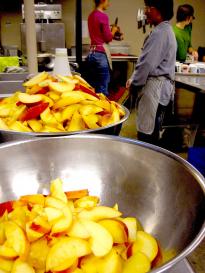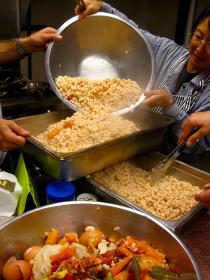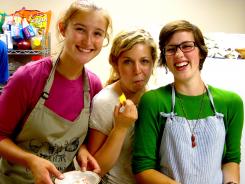






 Fennel roasted until the top is lightly crisp, mock porchetta seasoned with fragrant rosemary, and vanilla ice cream topped with fresh Door county peaches is not the typical description of a cheap, undergraduate meal.
Fennel roasted until the top is lightly crisp, mock porchetta seasoned with fragrant rosemary, and vanilla ice cream topped with fresh Door county peaches is not the typical description of a cheap, undergraduate meal.
But that is exactly what over 95 students and community members were served by the University of Wisconsin – Madison’s student chapter of Slow Food for $5, at Monday’s Family Dinner Night.
Slow Food is an international organization with Italian roots that values food that is good for the people who eat it, the people who produce it, and for the earth. Slow Food UW is one of 200 chapters under the umbrella of Slow Food USA.
Located in the basement of The Crossing on University Avenue, Family Dinner Night is the cornerstone of the university’s chapter, and a challenge they take on every week. The event features a different guest chef every week, sometimes from Madison restaurants like L’Etoile.
“We’ve been doing $5 dinners since we started 3 years ago,” said Jenna Liberman, UW-Madison undergraduate and Director of Membership for Slow Food UW.
Liberman explained that their $5 dinners, sourced almost entirely locally and organically, grew from a monthly meal of 20 people in 2008, to a weekly dinner now often serving over 100 people.
The success of Slow Food UW’s $5 Family Dinner Nights caught  the attention of Slow Food USA, and was the inspiration for the organization’s national day of action, held on September 17.
the attention of Slow Food USA, and was the inspiration for the organization’s national day of action, held on September 17.
According to slowfoodusa.org, more than 30,000 Slow Food enthusiasts shared over 5,500 meals during the day of action, all adhering to Slow Food ideals, and all for $5 per plate.
“This will be something they crow about,” said Matt Feifarek, Board Chair of Slow Food Madison. “And the idea came from Slow Food UW.”
Jen Bloesch, Co-Director of Slow Food UW explained how the idea developed from one chapter to a nation-wide event.
“Slow Food USA saw how successful we’ve been through our end of year report,” she said. “They contacted me and said this is our idea for national day of action and we helped put some materials together for it.”
The $5 cutoff stems from the idea that healthy, quality food should not mean expensive food. Both Slow Food UW and Slow Food Madison members agree that the Slow Food organization can have an elitist reputation, and their $5 meal is a means to counteract that impression.
“We’re working on ways to include all Madisonians, to spread the word that slow food, good food, does not at all mean expensive food,” said Tony Sturm, a founder of Slow Food UW, and now board member of Slow Food Madison.
Of the 40 campuses involved in the national program, Slow Food on Campus, Slow Food UW is by far the largest chapter. Elaborating on their success, Liberman mentioned that when comparing Slow Food campus chapters, Slow Food USA sometimes removes UW from graphic representations so as not to dwarf the data from other campuses.
Slow Food Madison is also one of the larger chapters in the country.
“It’s not the biggest, the biggest is probably New York City where I used to volunteer,” Feifarek said. “They had 700 members when I left. Madison has about 200 members.”
However, when comparing New York City to Madison, the population to member ratio for Madison is pretty impressive, he added.

According to slowfood.com, Slow Food International believes “that everyone has a fundamental right to the pleasure of good food and consequently the responsibility to protect the heritage of food, tradition and culture that make this pleasure possible.”
With their $5 meals, Slow Food UW is undoubtedly a credit to the movement.
“We are students, we’re faculty, we’re community members, eating and enjoying food but it’s not expensive,” Liberman said. “The $5 dinner is us.”
|
|
|
Welcome to the Madison Commons, a website designed to provide news and information about all of Madison's neighborhoods and a crossroads for the discussion of community issues. The name comes from the idea of a village commons, a place for news, talk, debate, and some entertainment, too, that's open to everyone.
All rights reserved. Read more about the Madison Commons and its partners.

